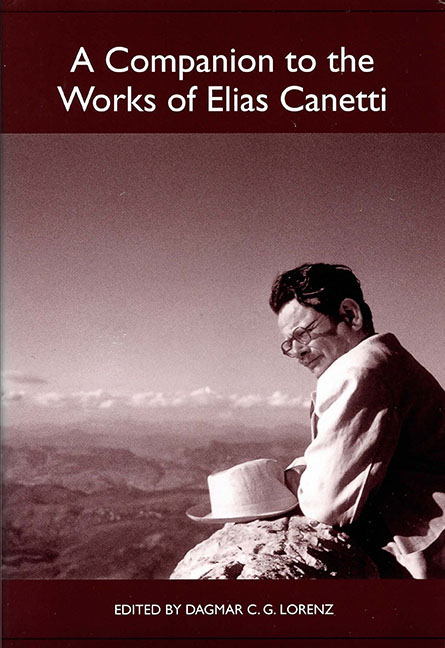Book contents
- Frontmatter
- Dedication
- Contents
- Canetti's Principal Works
- Abbreviations of Works Frequently Cited
- Introduction
- Canetti's Global Significance
- Writing and Language
- The Works: Themes and Genres
- Philosophy and Social Thought
- Historical Contexts
- Canetti, Roustchouk, and Bulgaria: The Impact of Origin on Canetti's Work
- Elias Canetti's Response to the Shoah: Masse und Macht
- Works Cited
- Notes on the Contributors
- Index
Canetti, Roustchouk, and Bulgaria: The Impact of Origin on Canetti's Work
from Historical Contexts
Published online by Cambridge University Press: 28 April 2017
- Frontmatter
- Dedication
- Contents
- Canetti's Principal Works
- Abbreviations of Works Frequently Cited
- Introduction
- Canetti's Global Significance
- Writing and Language
- The Works: Themes and Genres
- Philosophy and Social Thought
- Historical Contexts
- Canetti, Roustchouk, and Bulgaria: The Impact of Origin on Canetti's Work
- Elias Canetti's Response to the Shoah: Masse und Macht
- Works Cited
- Notes on the Contributors
- Index
Summary
The connection between Elias Canetti's perception of places and events and their representation in his works has prompted us to investigate the geographical and historical reality beyond the text in Canetti's autobiographical account Die gerettete Zunge: Geschichte einer Jugend (1977). We shall trace the history of Canetti's birthplace, Roustchouk, Bulgaria, where he spent his childhood years from 1905 until 1911, and explore how the memory of Roustchouk is represented in his autobiographical, fictional, and philosophical writings in an effort to outline the way these early experiences in his native city inspired major themes in his work. We will also examine the story behind the Canetti's (his father's family's) and the Arditti's (his mother's family's) arrival in Roustchouk more than half a century before Elias's birth, and the way the city's history is intertwined with these family histories. Indeed, the history of Sephardic families like the Canettis is an integral part of Roustchouk's history, and Canetti's autobiography calls for an assessment of Bulgarian-Jewish relations as they evolved over time. Of particular importance for Canetti's work is the fate of the Jews in Bulgaria during the Second World War and the Holocaust. Canetti's thoughts and ideas revolve around mass movements, mass destruction, the paranoid leader, and power, and although he did not identify specific events, his worldview was shaped by the trauma inflicted on Eastern European Jewry by the National Socialists. Even though he had taken exile in England, the fate of his family and friends in Central and Eastern Europe concerned him deeply. This essay seeks to shed light on the situation in Bulgaria during these difficult times.
Despite German authors’ longstanding fascination with travel and adventure, Bulgaria played only a minor role in German novels and travel writings. The first known representation of Bulgaria in German literature is Heinrich von Neustadt's Apollonius (1314), a work written prior to the 1364 Turkish invasion of Bulgaria, when Bulgaria was a powerful and influential country. Heinrich describes the courageous and powerful Bulgarian king, Abacuck, who threatens a northeastern European country named Armenia. The first mention of Roustchouk occurs in the context of a conflict. Apollonius makes reference to different ethnicities in the Balkans: the Bulgarian king is associated with both Bulgaria and “grosse Romaney,” but we also find mention of another king of Romania, and the lines of distinction between Bulgarians and Romanians are thus blurred.
- Type
- Chapter
- Information
- A Companion to the Works of Elias Canetti , pp. 261 - 288Publisher: Boydell & BrewerPrint publication year: 2004

